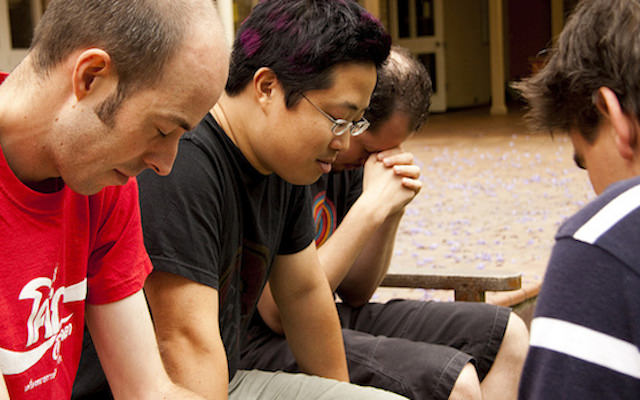Today I am excited to post a portion of an article written by my friend, Robby Gallaty. Robby is the Senior Pastor of Brainerd Baptist Church in Chattanooga, TN. He was radically saved out of a life of drug addiction on November 12, 2002. The Lord is using Robby in significant ways at Brainerd and Robby is deeply passionate about discipleship. I encourage you to check out Robby’s ministry: Replicate Ministries.
After Jesus issued the command to “make disciples of all nations” in Matthew 28, His followers enthusiastically obeyed His challenge. Christianity infiltrated the pagan world at a rapid pace. These days, however, discipleship is often cast aside because the results, compared to evangelistic efforts, are hard to measure. The time investment is long and the work is arduous. You can’t microwave a disciple. Discipleship is a crockpot recipe. It takes time for spiritual growth to take root.
One of the main issues our churches face is the vast number of pastors who have never been discipled. It’s very difficult, if not impossible, to take someone on a journey you haven’t been on. Regardless, the church is for disciple-making and disciple-making is for the world. This is not an optional command. It’s time we stop making excuses and start making disciples. Here are five steps for creating a disciple-making movement in your context.
-
Pray for God to change the hearts of people.
If we spent as much time asking God to change people’s hearts as we do trying to get people’s hearts changed toward the things of God, we would see more change. God is the author of every spiritual awakening.
-
Know where you’re heading.
You can’t change the path you’ve been on, but you can change where you’re heading. Determine where you’re heading and how you will get there. Define what a disciple looks like and develop a strategy for equipping your people. Remember, if you aim at nothing, you will hit it every time.
-
Change your language.
Language changes culture. Your people will celebrate whatever you celebrate. Stop celebrating the ABC’s of church success—attendance, buildings, and cash—and start celebrating discipleship. Change is difficult, especially when things are going well. Mark Devries, in his book Sustainable Youth Ministry, said, “When momentum is strong and energy is high, the last thing most churches are thinking about is changing something.” Discipleship is not just a ministry in the church. It’s the ministry of the church.
We also need to stop being impressed with successes in ministry that distract from the goal to make disciples. I challenged our staff a few years ago to apply the K.I.S.S. method to every ministry in their department: evaluate everything you do and decide whether to Keep it, Increase it, Stop it, or Start it. Some of my staff learned the hard lesson that it was harder to eliminate ministries that took away from our mission than to start new ministries. We think long and hard now before engaging in new avenues of ministry.
-
Stop focusing on information and start focusing on transformation.
I posed a question to our congregation one Sunday morning: “Many of you heard my message from last Sunday morning, you then listened to a different message about a different topic during the Sunday School hour, next you heard a different message on Sunday night, followed that up with a totally different message on Wednesday night, and finally, for those who had the time, you attended a Bible study during the week. How many of you can tell me the points from last Sunday’s message?”
No one raised a hand.
We must not equate maturity with knowledge. In his book Deliberate Simplicity Dave Browning rightly commented, “I am convinced that the gap holding back most believers is not the gap between what they know and what they don’t know. It’s the gap between what they know and what they’re living. . . . We are educated beyond our obedience.” Reiteration and reinforcement are as important if not more so than transfer of information. A discipleship group offers you an avenue for implementation and application of spiritual truth.
-
Create a discipleship pathway for spiritual growth.
Most believers are incapable of connecting the dots for spiritual growth in their lives. Because they have watched idly from the pews, it will take some time before they get off the bench and into the game. This is why people need a pathway to walk on. The Discipleship Pathway we use at Brainerd Baptist is based on Jesus’ discipling relationships in the Gospels. (You can download the Disciplemaking Pathway at replicate.org.) It is a fourfold strategy for exponential growth: Congregation (large gathering), Community (life groups), Core (d-groups), and Close (relationship with God).
In our first membership matters class that we offered, a college student raised her hand to ask a question at the end of the 4-hour presentation. She said, “Pastor, I am so excited about what’s going on at Brainerd. We are involved in so many things. Our church has so much to offer. However, I have a problem. I don’t know where to start.”
We have found that when people don’t know what to do, they don’t do anything at all, or they do everything. When people have too many options, they don’t do anything at all, either. By offering the Disciplemaking Pathway to our people, they can assess where they are in the journey and take the next step. I’m constantly repeating from the pulpit, “What step are you on in the pathway? Now take the next one.”
If you’d like to see the full article, you can click here.





